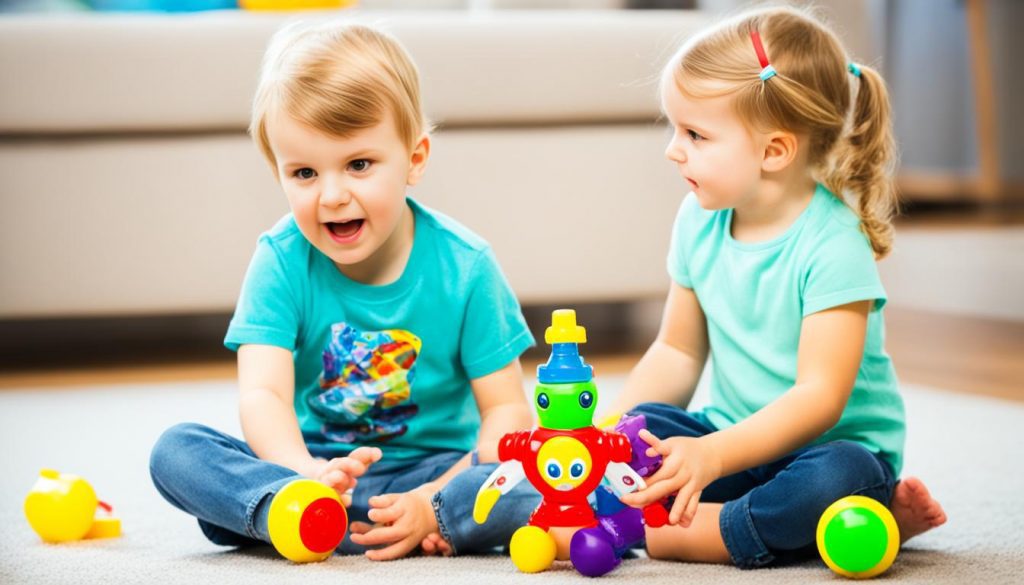Welcome to our article on managing sibling rivalry and promoting harmony at home. As parents, we understand that sibling relationships can be a mix of love, camaraderie, and sometimes, rivalry. While sibling conflicts are a natural part of growing up, it’s essential to have effective strategies in place to minimize conflicts and foster a positive environment for our children.
When it comes to sibling rivalry, there are several factors that can contribute to its occurrence. Competition for attention, differences in personalities and interests, birth order dynamics, and perceived favoritism are common triggers for sibling conflicts. Unresolved rivalry can strain relationships and impact the overall dynamics of the family.
But don’t worry, we’re here to help! In this article, we’ll explore practical tips and strategies for managing sibling rivalry, promoting sibling harmony, and navigating disagreements between our little ones. From fostering individuality and respect to teaching conflict resolution skills, we’ll cover it all.
Key Takeaways:
- Understanding the causes of sibling rivalry is the first step in managing and preventing conflicts.
- Establishing fair and consistent parenting practices can help minimize favoritism and ease sibling tensions.
- Allocating one-on-one time with each child can foster a sense of individuality and reduce competition for attention.
- Teaching conflict resolution skills and encouraging collaboration and teamwork can promote positive sibling relationships.
- Creating family rituals and traditions can strengthen sibling bonds and provide a sense of belonging.
The Effects of Sibling Rivalry on Family Relationships
Prolonged and unresolved sibling rivalry can have significant impacts on family dynamics and strain relationships well into adulthood. The effects of sibling rivalry extend beyond the individuals involved, creating tension within the entire household and affecting parental stress levels.
Constant rivalry between siblings can lead to strained sibling relationships, impairing the bond that should ideally be a source of support and companionship. These strained relationships can have long-term impacts on the family as a whole, impacting communication, cooperation, and overall harmony.
One of the key issues that arise from prolonged sibling rivalry is the impairment of communication skills. Siblings engaged in constant conflict may struggle to effectively communicate their wants, needs, and feelings, leading to difficulties in resolving conflicts and fostering healthy relationships.
To better understand the effects of sibling rivalry on family dynamics and relationships, let’s take a look at the following table:
| Effects of Sibling Rivalry | Impacts |
|---|---|
| Strained Sibling Relationships | Damage to the bond between siblings, leading to reduced closeness and support |
| Impact on Family Dynamics | Increased tension and stress within the entire family, disrupting overall harmony |
| Impaired Communication Skills | Difficulty in resolving conflicts, fostering effective communication, and building healthy relationships |
Strategies for Promoting Sibling Harmony
When it comes to managing sibling rivalry, there are practical strategies that parents can implement to foster positive relationships among siblings and promote sibling harmony.
Foster Individuality and Respect
Encouraging the uniqueness and individuality of each child can help minimize feelings of competition and jealousy. Celebrate their diverse personalities, interests, and accomplishments. Emphasize the importance of respect for one another’s boundaries and personal space.
Establish Fair and Consistent Parenting
Consistency is key in creating a sense of fairness and predictability at home. Set clear expectations and rules for behavior, and ensure they are consistently applied to all children. This approach helps minimize feelings of favoritism and promotes an equitable family environment.
Allocate One-on-One Time
Spending quality time individually with each child is essential for nurturing their unique bond. Plan special activities or outings that cater to their individual interests, allowing for undivided attention and a chance to connect on a deeper level.
Encourage Collaboration and Teamwork
Promote a sense of teamwork and cooperation among siblings by engaging them in collaborative activities. Encourage them to work together on projects, play games, or participate in household chores. This fosters a positive dynamic where siblings learn to support and rely on one another.
Teach Conflict Resolution Skills
Conflict is inevitable among siblings, but teaching them effective conflict resolution skills can help minimize the impact of disagreements. Encourage open and respectful communication, active listening, and finding compromise. Provide guidance on how to express feelings constructively and find solutions that work for everyone.
Create Family Rituals and Traditions
Elevating the sense of togetherness within the family can strengthen sibling bonds. Establishing meaningful family rituals and traditions, such as weekly game nights, holiday traditions, or special family outings, fosters a sense of belonging and creates lasting memories for siblings to cherish.
Promote Positive Reinforcement
Encouraging and rewarding positive behavior among siblings helps reinforce their bond and strengthen their relationship. Praise and acknowledge their kindness, cooperation, and acts of support towards each other. This fosters a positive and nurturing sibling dynamic.
| Strategies | Benefits |
|---|---|
| Foster individuality and respect | Minimizes competition and fosters acceptance |
| Establish fair and consistent parenting | Promotes equity and eliminates favoritism |
| Allocate one-on-one time | Nurtures individual bonds and deepens connections |
| Encourage collaboration and teamwork | Fosters a supportive dynamic and teaches cooperation |
| Teach conflict resolution skills | Promotes healthy communication and problem-solving |
| Create family rituals and traditions | Strengthens the sense of belonging and togetherness |
| Promote positive reinforcement | Strengthens the sibling bond and encourages positive behavior |
Encouraging Communication and Active Listening
Transparent communication is the cornerstone of fostering trust and understanding between siblings. By promoting open dialogue, parents create an environment where siblings can express their viewpoints, share their experiences, and acknowledge each other’s feelings. Encouraging communication and active listening among siblings builds empathy and strengthens their bond.
Active listening is a vital skill that allows siblings to fully engage with one another’s thoughts and emotions. It involves giving undivided attention, maintaining eye contact, and responding thoughtfully. When siblings actively listen, they demonstrate respect and validate each other’s perspectives, fostering a deeper understanding of one another.
To cultivate an atmosphere of communication and active listening:
- Encourage siblings to share their thoughts and feelings without judgment.
- Teach them to express themselves assertively and respectfully.
- Provide opportunities for siblings to actively listen to one another by engaging in meaningful conversations and problem-solving activities.
By promoting communication and active listening, parents play a crucial role in nurturing strong sibling relationships. They create a supportive and inclusive atmosphere where siblings feel heard, understood, and valued.
Benefits of Effective Communication and Active Listening
Cultivating effective communication and active listening skills among siblings yields numerous benefits:
- Promoting Understanding: Open communication allows siblings to gain insight into each other’s perspectives, experiences, and emotions. It deepens their connections and fosters empathy and understanding.
- Resolving Conflicts: Active listening enables siblings to engage in constructive conflict resolution. By listening attentively and rationally discussing their differences, they can find common ground and reach mutually beneficial agreements.
- Building Trust: Transparent communication builds trust among siblings. When they feel heard and acknowledged, they are more likely to trust and support one another, creating a solid foundation for their relationship.
- Enhancing Problem-Solving: Effective communication and active listening empower siblings to work together in finding solutions to challenges. They learn to consider multiple perspectives, think critically, and collaborate effectively.
- Fostering Empathy: By actively listening to each other’s thoughts and emotions, siblings develop empathy – the ability to understand and share the feelings of others. This empathetic connection contributes to a deeper and more compassionate sibling bond.
Cultivating effective communication and active listening skills between siblings is a lifelong gift that equips them with the tools needed to build strong, harmonious relationships both within their family and beyond.
Promoting Individuality and Celebrating Differences
In order to foster a supportive and inclusive atmosphere, it is important to promote individuality and celebrate the uniqueness of each child. By creating a welcoming and secure environment, children are encouraged to embrace their own identity and appreciate the diverse qualities of others.
One way to promote individuality is by featuring a range of role models who represent different backgrounds, interests, and abilities. This helps children understand that there is not one “right” way to be, and that everyone’s differences should be celebrated. Seeing diverse role models can also inspire children to explore their own passions and talents.
Another key aspect of promoting individuality is fostering self-esteem in children. By nurturing their sense of self-worth and confidence, children learn to embrace their unique qualities and feel empowered to express themselves authentically. This can be done through positive affirmations, encouraging their interests and hobbies, and providing opportunities for them to showcase their talents.
Encouraging children to express their thoughts, opinions, and emotions also plays a vital role in promoting individuality. By creating an open and accepting space for communication, children feel safe to share their ideas and perspectives. This helps them develop their own voice and encourages them to think independently.
Ultimately, promoting individuality and celebrating differences helps children develop a strong sense of self and fosters their self-esteem. It allows them to embrace their unique qualities and contributes to a more inclusive and accepting society.
Establishing Clear Family Rules and Expectations
When it comes to promoting effective communication and maintaining a harmonious family environment, clear family rules and expectations play a vital role. These guidelines provide a framework that fosters open and successful communication among family members, helping to prevent conflicts and misunderstandings.
By establishing boundaries through clear rules and expectations, everyone in the family becomes aware of their roles and responsibilities. This awareness creates a sense of accountability and helps to foster mutual respect. When each family member knows what is expected of them, they can navigate their interactions with one another more effectively, reducing tension and promoting positive relationships.
Setting clear rules and expectations also encourages effective communication and conflict resolution. When family members have a shared understanding of acceptable behavior and how to address disagreements, they can navigate conflicts more constructively. This facilitates effective problem-solving and promotes understanding and empathy.
To create clear family rules and expectations, consider involving everyone in the process. Encourage open dialogue, allowing each family member to contribute their thoughts and ideas. This collaborative approach not only strengthens the sense of ownership but also ensures that the rules and expectations are fair and reasonable for everyone involved.
Here are some steps to consider when establishing clear family rules and expectations:
1. Identify key areas:
- Discuss and identify the core values and principles that you want your family to uphold.
- Identify specific areas where rules and expectations are necessary, such as chores, homework, screen time, and sibling interactions.
2. Involve the entire family:
- Hold a family meeting to discuss and establish the rules and expectations together.
- Encourage each family member to offer their input and suggestions.
- Ensure that the rules and expectations are fair and reasonable for everyone.
3. Clearly communicate the rules:
- Write down the rules and expectations in a clear and concise manner.
- Display them in a visible place, such as on a family bulletin board or a common area in the house.
- Ensure that everyone understands and acknowledges the rules.
The image above visually represents the importance of establishing clear family rules and expectations in promoting effective communication and fostering a harmonious family environment.
By establishing clear family rules and expectations, you create a foundation for open communication, mutual respect, and understanding. These guidelines provide a roadmap for everyone in the family to follow, promoting cooperation and strengthening the bonds between family members.
Conclusion
Managing sibling rivalry is an ongoing process that requires patience, understanding, and consistent effort. By understanding the causes of sibling rivalry, recognizing its potential long-term effects on family relationships, and implementing practical strategies, parents can foster sibling harmony. Siblings can be each other’s greatest allies and lifelong companions.
By promoting cooperation, minimizing conflicts, and encouraging positive relationships, parents can help their children build strong bonds that will support them throughout their lives and contribute to a more harmonious and loving family environment.
Remember, sibling rivalry is a natural part of growing up, but with the right approach and a commitment to fostering positive relationships, parents can navigate through the challenges and create a supportive and nurturing atmosphere for their children. Celebrate the uniqueness and individuality of each child, establish clear family rules and expectations, and encourage open communication and active listening. These strategies, combined with love and understanding, can go a long way in promoting sibling harmony and fostering positive relationships that will last a lifetime.
FAQ
What are the causes of sibling rivalry?
Sibling rivalry can be caused by competition for attention, differences in personalities and interests, birth order dynamics, and perceived favoritism.
What are the long-term effects of sibling rivalry on family relationships?
Prolonged and unresolved sibling rivalry can strain relationships and impact family dynamics. It can also lead to difficulties in resolving conflicts and fostering healthy relationships.
How can parents promote sibling harmony?
Parents can foster sibling harmony by fostering individuality and respect, establishing fair and consistent parenting, allocating one-on-one time, encouraging collaboration and teamwork, teaching conflict resolution skills, creating family rituals and traditions, and promoting positive reinforcement.
How can communication and active listening help promote sibling harmony?
Transparent communication fosters a culture of trust between siblings, helping them better understand each other’s viewpoints and feelings. By encouraging communication and active listening, parents create a supportive and inclusive atmosphere for their children.
How can parents promote individuality and celebrate differences among siblings?
Parents can promote individuality and celebrate differences by creating a welcoming and secure environment, featuring a range of role models, and helping children develop self-esteem and confidence in their unique qualities.
Why is it important to establish clear family rules and expectations?
Clear family rules and expectations provide a framework for open and successful communication within the family. Setting clear boundaries promotes closer ties, respect, and understanding among family members.



